|
|
|
Sort Order |
|
|
|
Items / Page
|
|
|
|
|
|
|
| Srl | Item |
| 1 |
ID:
140051
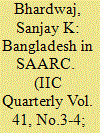

|
|
|
| 2 |
ID:
152677
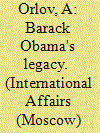

|
|
|
|
|
| Summary/Abstract |
THIS ARTICLE is a logical continuation of my previous essay, "Barack Obama: Preliminary Results of Presidency"1 that I ended with: "Obama has several months to go down to history not as the president of numerous conflicts and the state of international relations close to the Cold War but as the president who gave the world a slim hope of positive changes." Today, we can say that he has missed his chance to be remembered as a peacemaker and a realistically minded president who knew how to defuse international tension rather than fan it to worldwide dimensions. Indeed, he did all he could to leave behind a wasteland of American-Russian relations and not the slightest hope of positive changes any time soon.
|
|
|
|
|
|
|
|
|
|
|
|
|
|
|
|
| 3 |
ID:
189903
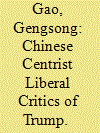

|
|
|
|
|
| Summary/Abstract |
This article challenges the existing scholarship’s characterisation of Chinese liberal intellectuals as Trumpian intellectuals. By conducting a close reading of Chinese academic publications, lectures and opinions aired on social media, this article finds that besides Trump’s Chinese liberal fans, many leading Chinese liberal intellectuals harshly criticised Trump. However, they do not align themselves with American liberals in making all-out partisan criticisms of Trump and American right-wing politics. Instead, their criticisms are mostly centrist. This article argues that Chinese liberal intellectuals’ centrist criticisms of Trump reflect their Confucian, egalitarian and moderate nationalist sympathies, dimensions of their thoughts which have been ignored by existing scholarship regarding them. By exploring Chinese centrist liberal critics of Trump, this article brings to light the ideological heterogeneity within the Chinese liberal camp previously lumped together under the umbrella of “anti-authoritarianism.”
|
|
|
|
|
|
|
|
|
|
|
|
|
|
|
|
| 4 |
ID:
152557


|
|
|
|
|
| Summary/Abstract |
Attempts at a Labour–Liberal Democrat Progressive Alliance came to nothing prior to the 1997 general election. The original idea of progressivism, first mooted in Britain in 1896, was an American one. Suggestions for a progressive alliance in the UK came from Lloyd George in 1914, and then again in 1931, each time with little effect. Nothing emerged after 1945 until the Lib–Lab pact negotiated by Callaghan and Steel in 1977, which led to electoral misfortune for both and the rise and fall of the SDP. In 2010 a coalition between the Lib Dems (under Clegg) and the Conservatives was always much the more likely option. Most Labour people no longer saw the Lib Dems as a party of the left. The Coalition Agreement in 2010 showed the idea of an alliance to be a centrist, elitist one with little grass-roots support. Such an alliance would flourish through abstract pressure groups rather than popular democracy, especially with a Labour party led by Corbyn. In the US and the UK, progressivism went badly wrong in its politics: Theodore Roosevelt's New Nationalist campaign of 1912 divided American reformers fatally, as did Lloyd George's postwar Coalition in Britain after 1918. Now, even after Brexit, a progressive alliance seems further away than ever. The story of the ‘Progressive Dilemma’ remains one of unrealistic projects, invariably disappointed.
|
|
|
|
|
|
|
|
|
|
|
|
|
|
|
|
| 5 |
ID:
142179


|
|
|
|
|
| Summary/Abstract |
Edward Said's concept of orientalism was developed from his perception of the role of scholarship in the West's exploitation of the East for the purpose of conquest and the maintenance of political power. It was not simply a construct of Eastern inferiority versus Western superiority. Hassan Hanafi, chair of philosophy at Cairo University, first encouraged a “science of occidentalism” to counter orientalist studies.1 However, as Syrian philosopher Sadiq al-Azm has suggested, one must heed Said's warning to the subjects and victims of orientalism against the dangers of applying the readily available structures, styles and ontological biases of orientalism upon themselves and others.2 That would result in orientalism in reverse, or the internalizing of orientalist political intentions.
|
|
|
|
|
|
|
|
|
|
|
|
|
|
|
|
| 6 |
ID:
122468
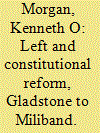

|
|
|
|
|
| Publication |
2013.
|
| Summary/Abstract |
Nineteenth-century constitutional reformers focussed on parliament. Their central idea was citizenship, modelled variously on the democracy of ancient Athens, small communities like Switzerland, and especially the United States, a particular inspiration for Gladstone who admired its constitution. The 1911 Parliament Act marked the final triumph of the Victorian Liberals legacy, with a very different impetus coming from Lloyd George during his coalition. Labour focussed on class, not the constitution, though the ILP favoured localism and devolution, before succumbing to a centralising unionism. Tawney championed the idea of social citizenship, emphasising activism and education. After 1945, Labour did not prioritize constitutional reform until the dramatic changes that came after 1997. Gordon Brown then revived the notion of citizenship, and possible codification, in pursuing the values of Britishness. Labour's legacy was a confusing one. But Ed Miliband's policy revision could reclaim the idea of citizenship, an egalitarian concept to counter the inequalities of class.
|
|
|
|
|
|
|
|
|
|
|
|
|
|
|
|
| 7 |
ID:
100889
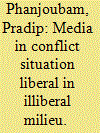

|
|
|
| 8 |
ID:
075424
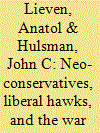

|
|
|
| 9 |
ID:
133517


|
|
|
|
|
| Publication |
2014.
|
| Summary/Abstract |
This article modifies the associations made by historians and political scientists of Spanish guerrilla warfare with revolutionary insurgency. First, it explains how the guerrilla phenomenon moved from a Leftist to a reactionary symbol. Second, it compares the insurgency and counter-insurgency features of the Carlist War (1833-1840) with those of the better-known Peninsular War (1808-1814). Third, it shows how erstwhile guerrilla leaders during the Carlist War made their expertise available to the counter-insurgency, in a socio-economic as well as military setting. This article revises the social banditry paradigm in nineteenth-century Spain in the under-researched context of Europe bloodiest nineteenth-century civil war.
|
|
|
|
|
|
|
|
|
|
|
|
|
|
|
|
| 10 |
ID:
080571
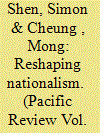

|
|
|
|
|
| Publication |
2007.
|
| Summary/Abstract |
Since the end of the Cold War, the international arena has witnessed two concurrent worldwide trends. One is the gradual prevalence of universalism under the banner of human civilization; the other is the gradual revival of nationalism globally under exactly the same heading. Both trends are evident in China, a country which in the twenty-first century is perceived universally as a rising nation. However, does Chinese nationalism necessarily pose a threat to the world? By examining two debates on the Chinese intellectual response towards Sino-American and Sino-Japanese relations in the early twenty-first century, this paper investigates the status of Chinese nationalism. It questions whether it is a fixed set of ideas embraced by a solid entity, or whether it possesses multiple layers with dual elements contributing to both security and insecurity internationally. The paper argues that three separate nationalist processes are occurring concurrently but independently of each other: the construction of civic nationalist values; the development of an international relations strategy assigning responsible power to China; and the detection of alleged anti-Chinese conspiracies. The effect of the first two would be to encourage regional peace, and they could offset fervent nationalist expression. A somewhat counter-intuitive result of Chinese nationalism might be that it also becomes a stabilizing force within and outside China's borders.
|
|
|
|
|
|
|
|
|
|
|
|
|
|
|
|
|
|
|
|
|